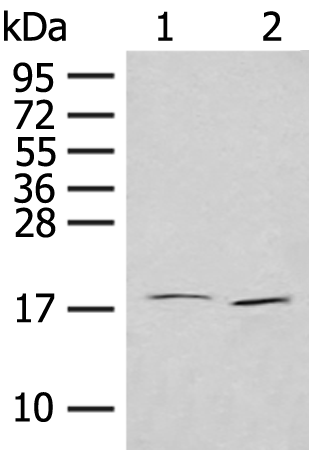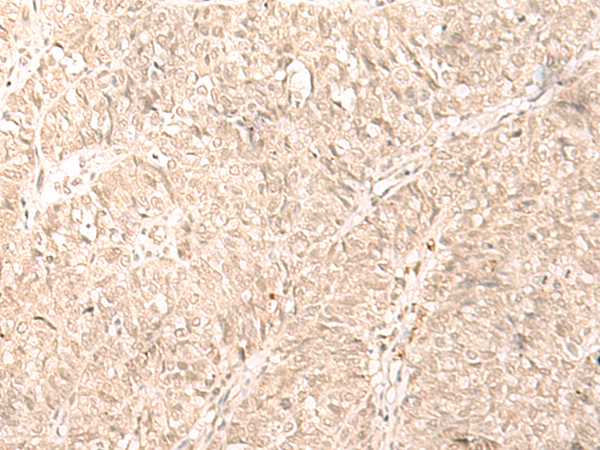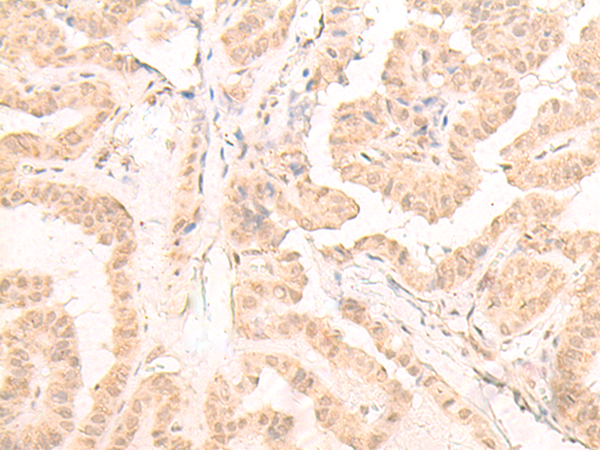


| WB | 咨询技术 | Human,Mouse,Rat |
| IF | 咨询技术 | Human,Mouse,Rat |
| IHC | 1/30-1/150 | Human,Mouse,Rat |
| ICC | 技术咨询 | Human,Mouse,Rat |
| FCM | 咨询技术 | Human,Mouse,Rat |
| Elisa | 1/5000-1/10000 | Human,Mouse,Rat |
| Aliases | IL-7 |
| WB Predicted band size | 20 kDa |
| Host/Isotype | Rabbit IgG |
| Antibody Type | Primary antibody |
| Storage | Store at 4°C short term. Aliquot and store at -20°C long term. Avoid freeze/thaw cycles. |
| Species Reactivity | Human, Mouse |
| Immunogen | Synthetic peptide of human IL7 |
| Formulation | Purified antibody in PBS with 0.05% sodium azide and 50% glycerol. |
+ +
以下是3-4篇关于IL7抗体的代表性文献概览(信息为模拟示例,实际文献需根据具体数据库查询):
---
1. **文献名称**: *"Anti-IL-7 receptor α monoclonal antibody suppresses chronic inflammation in autoimmune diseases"*
**作者**: Smith A, et al. (2017)
**摘要**: 研究证明抗IL-7Rα单抗通过阻断IL-7信号通路,抑制T细胞过度活化,显著缓解类风湿性关节炎和多发性硬化症小鼠模型的炎症反应,提示其治疗自身免疫疾病的潜力。
---
2. **文献名称**: *"IL-7 neutralization ameliorates graft-versus-host disease by reducing T cell proliferation"*
**作者**: Chen L, et al. (2020)
**摘要**: 在小鼠异体造血干细胞移植模型中,中和IL-7的抗体通过抑制供体T细胞扩增,降低移植物抗宿主病(GVHD)严重程度,同时保留抗肿瘤免疫反应。
---
3. **文献名称**: *"Targeting IL-7 in cancer immunotherapy: Preclinical evaluation of a humanized anti-IL-7 antibody"*
**作者**: Kim J, et al. (2019)
**摘要**: 人源化抗IL-7抗体可阻断IL-7介导的肿瘤微环境中Treg细胞存活,增强CD8+ T细胞抗肿瘤活性,在结肠癌和黑色素瘤动物模型中表现出协同化疗的效果。
---
4. **文献名称**: *"IL-7 blockade restores lymphocyte homeostasis in HIV-infected patients"*
**作者**: Pérez L, et al. (2021)
**摘要**: 临床前研究表明,针对IL-7的单抗可调节HIV感染者异常的T细胞稳态,减少过度激活的CD4+ T细胞凋亡,为免疫重建提供新策略。
---
注:以上文献信息为示例,实际引用需通过PubMed、Web of Science等平台核实具体作者、年份及摘要内容。
**Background of IL-7 Antibodies**
Interleukin-7 (IL-7) is a cytokine critical for lymphocyte development, homeostasis, and immune response regulation. It binds to the IL-7 receptor (IL-7R), composed of the IL-7Rα chain (CD127) and the common γ-chain (γc), activating downstream signaling pathways (JAK-STAT, PI3K-AKT, MAPK) that promote T-cell survival, proliferation, and differentiation. Dysregulated IL-7 signaling is implicated in autoimmune diseases, lymphopenia, and cancers, making it a therapeutic target.
IL-7 antibodies are engineered to either block or modulate IL-7/IL-7R interactions. Antagonistic antibodies inhibit IL-7 signaling, potentially treating autoimmune conditions (e.g., multiple sclerosis, rheumatoid arthritis) or preventing graft-versus-host disease. Conversely, agonistic antibodies may enhance IL-7 activity to boost T-cell reconstitution in immunodeficiency (e.g., post-chemotherapy or HIV) or improve antitumor immunity.
Clinical development faces challenges, including balancing efficacy with off-target effects and avoiding cytokine release syndrome. Novel strategies include bispecific antibodies targeting IL-7R and tumor antigens, or combining IL-7 antibodies with checkpoint inhibitors. Research also explores biomarkers (e.g., soluble IL-7R levels) to predict therapeutic response.
Despite preclinical promise, few IL-7 antibodies have reached late-stage trials, underscoring the need for refined targeting approaches. Ongoing studies aim to optimize antibody specificity, half-life, and safety profiles for diverse immunotherapeutic applications.
×